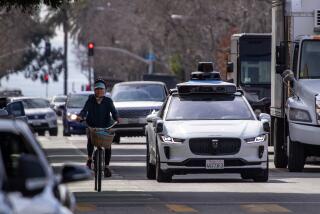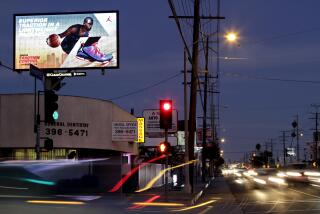New ad platform targets mobile users by scouring social media
Mobile advertising is about to become a lot more personal.
Pasadena technology company UberMedia has launched a mobile advertising platform that tracks publicly available information provided by smartphone users on their social media channels and then offers them ads based on their interests and habits.
UberAds scours sites such as Twitter, Pinterest and Instagram for clues about mobile device users. For example, the platform can send movie trailers to users who have tweeted frequently from a movie theater, indicating they’re probably film buffs. People who pin lots of photos of food and tweet about dining out are more likely to receive restaurant-related ads.
PHOTOS: Top smartphones of 2013
Users will also be targeted by GPS location tracking: Those who were tracked as being at a car dealership, for example, could receive advertisements for new cars and accessories. Someone who is in an area where it’s heavily snowing could see ads for snow tires.
Time of day also becomes a factor: Brands that cater to a lunch crowd, for example, will see their ads displayed during the noon time frame.
Brands including BMW, H&M;, Macy’s, McDonald’s and Pizza Hut have signed on. Many have already seen significant increases in click-through rates, said Bill Gross, founder and chief executive of UberMedia.
Gross, who also founded Pasadena business incubator Idealab, said the idea behind UberAds was to turn intrusive mobile ads into “invited” ones that users find more relevant and useful.
Universal Pictures recently used UberAds to run an ad campaign for the film “Oblivion,” targeted toward consumers who indicated on Twitter that they liked Tom Cruise. Doug Neil, senior vice president of digital marketing for Universal Pictures, said the company saw three to four times the typical level of user engagement from the campaign.
“It’s more efficient and cost-effective from a marketer’s standpoint,” Neil said. “It becomes 1:1 marketing when you can personalize it at that level.”
The challenge of successful mobile advertisements has been plaguing marketers for years, Gross said. Banner ads and general spamming have proven ineffective for advertisers and annoying for mobile users.
“You can’t take what works in one medium and point it into a new medium,” he said. “That’s what always happens first, but that’s not going to work.”
The personalized approach, he said, should benefit all parties — brands, consumers and ad publishers — especially as mobile usage increases. Gross said he expected mobile to become a majority of Internet traffic this year but pointed out that mobile ad revenue is still just 10% of total Internet ad revenue.
For those who feel uncomfortable at the thought of advertisers learning more and more about mobile users, Gross noted that UberAds only gleans information from publicly available sources — an unlocked Twitter feed, for instance, versus a private Facebook profile — and that the information gathered is “completely anonymous.”
“We don’t have any private, personalized identifiable information,” he said. “People could be creeped out or they could say, ‘Well, this is better than seeing a stupid ad.’”
He also noted that users have to opt in to location tracking when they first open a downloaded app.
“People will have to get trained, will have to get used to the fact that when they opt in to that, they’re doing it for the purpose of making the ads better,” he said. “I think it’ll take time for users to understand that.”
ALSO:
Female tech entrepreneurs flourish in L.A.
Payvia buys mobile marketing firm Mogreet
A new wave of shared workplaces rolls through Silicon Beach






